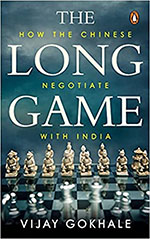It goes without saying that China is India’s most important neighbour and the India-China bilateral relations is the most consequential diplomatic engagement for India in the 21st century. Despite greater attention being paid to China in India recently, there is still not enough research and writing that would stand the test of the time. However, the gap is getting filled with a lot of quality work that has been published recently. Vijay Gokhale, who retired as India’s Foreign Secretary and has had a long engagement with China in various capacities over his diplomatic career, has written the work under review, The Long Game: How the Chinese Negotiate with India.
This book looks at six distinct episodes where India and China negotiated with one another on matters of mutual interest. This is a small book at 160 pages but it’s densely packed and a fast-paced read. These events span an extended time period, two being the most consequential ones: India’s recognition of China in 1949 and the Agreement on the Trade and Intercourse between Tibet Region of China and India in 1954. The other four are more recent: the Indian nuclear test of 1998, the recognition of Sikkim as part of India in 2005, the 123 Agreement and India-specific exemptions at Nuclear Suppliers Group (NSG) in 2008 and the listing of Masood Azhar in the 1267 Committee of the United Nations in 2019. These four instances are where Gokhale is likely to have been involved in some or the other capacity, although he does not single out his own contributions in this work.

